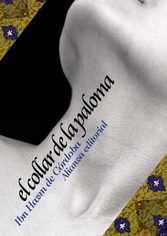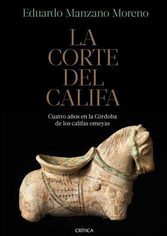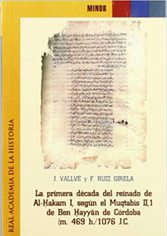Books and publications
Index / Activities / Books and publications / "Delving into al-Andalus" reading workshop
"Delving into al-Andalus" reading workshop
From February 16, 2021 until October 07, 2021The workshops will be held on Thursdays at 6:00 p.m. (check times and dates)
ONLINE
Zoom
The workshops will be held on Thursdays at 6:00 p.m. (check times and dates)
Prior registration required.
In Spanish.
As of March 18, we will be offering this series of reading workshops which aim to offer the public an accurate though intimate look at the historical reality of the Umayyad period.
To do this, we will undertake this guided experience of shared reading of those titles and authors who, across genres and centuries, best portray the key aspects and characters in understanding Al-Andalus in all its greatness.
“Delving into Al-Andalus” is an activity designed and coordinated by Daniel Valdivieso Ramos, a well-known author of historical books intended for wide audiences about Al-Andalus and an editor at the Almuzara and Utopía Libros publishing firms. A consultant for Sexto Mario Patrimonio y Educación, he is also the coordinator of many official activities at the Madinat al-Zahra Archeological Site and a regular collaborator at Casa Árabe, an institution at which he has given the conferences The “Arrabal Incident”: Qurtuba’s rebellion against Emir Al-Hakam (2018) and Abd El Rahman “The Émigré”: The myth of the last Umayyad (2020). In his budding literary career, he has had best-sellers and critically acclaimed titles published, including La Córdoba de Ibn Hazm (Ibn Hazm’s Cordoba) and most recently, Abd al-Rahman al-Dahil (2020).
The activity, designed for all audiences, is intended to provide a deeper, more comprehensive knowledge of the proposed texts, delving into the historical reality described in their pages.
Holding of the activity
Each of the workshops will last one month in all. It will begin with a prior briefing session and will end with the reading workshop itself. In the interim, the participants will have enough time to read the proposed book and pose any questions that they may have to the activity coordinator by e-mail.
- Initial briefing session (2 hours)
The coordinator will hold an online meeting (in compliance with health recommendations) with the participants to introduce them to the chosen book, during which a short summary of the book will be provided, as well as a biography of the author, a justification of the author and book choice (in terms of their contribution to the knowledge of the history of Al-Andalus, particularities of the text, etc.), and a historical introduction to the context in which the plot takes place, sharing curiosities, anecdotes and relevant information to more greatly enjoy and get a better understanding of the selected titles.
While this session is held, information sheets will be sent out, as well as practical information to search for or purchase the books. Likewise, any potential questions that may arise during the reading will be answered.
- Reading workshop (2 hours)
Once the reading period has come to an end, the coordinator will meet with the participants online again so that they can freely discuss their impressions of the book, characters, etc., with a moderated debate about the historical reality portrayed in the text. In the form of a conclusion, the coordinator will guide all the ideas presented towards the key concepts, thus performing a dynamic evaluating of all the knowledge acquired.
Registration
The course will last 4 hours per session and will cost 4 euros for the general public at our headquarters. 3 euros for online payments, the officially unemployed, Casa Árabe’s Language Center students and Youth Card holders. You must complete payment at least one week prior to each reading session. Sales on our website (in the information provided on each session), or at Casa Árabe’s headquarters in Cordoba (in cash or by credit card). Once your registration and payment have been confirmed, you will receive an email message containing a link that is used to join the first online session.
The number of participants is limited to a maximum of 25.
Provisional dates
The Ring of the Dove. Ibn Hazm, translation by Emilio García Gómez (published by Alianza Editorial).
The Caliph’s Court: Four years in the Córdoba of the Umayyads. Eduardo Manzano (published by Crítica).
The first decade of the reign of al-Hakam I, according to the Muqtabis II-1 of Ben Hayyan of Cordoba. J. Vallvé. and F. Ruiz Girela (Royal Academy of History).
Almanzor. Laura Bariani (published by Nerea).
Remember that you receive a discount on all of the books for this reading workshop if you purchase them at Casa Árabe’s Balqís Bookstore, either at our Madrid headquarters or online.
-

Reading workshop: "The Ring of the Dove"
From February 18, 2021 until April 15, 2021The sessions will take place on March 18 and April 15 at 6:00 p.m.ONLINEZoom The sessions will take place on March 18 and April 15 at 6:00 p.m. The sessions will take place on March 18 and April 15 at 6:00 p.m. Free of charge. Prior registration required.In Spanish.As part of the workshops titled "Delving into Al-Andalus", conducted by Daniel Valdivieso, we are beginning with this first free session on March 18. Registration is required (link here).On March 18, we will begin this guided experience of shared reading of those books and authors who best portray the key aspects and characters for understanding Al-Andalus in all its grandeur across different genres and eras. On this occasion, we will be reading the book The Ring of the Dove by Ibn Hazm (published by Alianza Editorial), in its classic Spanish translation by Arabist Emilio García Gómez (El collar de la paloma).The Ring of the Dove or Tawq al-hamama is Ibn Hazm’s masterpiece, completed around 1023, in which the Cordovan polygraph combines prose, poetry and curiosities about Qurtuba society at the end of the early eleventh century.Summary: The Ring of the Dove is one of the most important writings in western Islamic culture and is constantly referred to and studied by historians and archeologists alike, because its pages contain information and direct references, in the form of numerous anecdotes, about characters and places in the Cordoba of the caliphs which can still be identified today. The text is basically a treatise on love and the behavior of lovers in all their facets. It intends to be timeless, adorned by the poet with his own reflections, experiences and elegant and refined poetic compositions. It is a first-hand testimonial of how love was experienced in Al-Andalus during the Umayyad dynasty’s reign.Ibn Hazm: Born to a wealthy family in Cordoba on November 7, 994, he was the son of one of Almanzor’s viziers. Due to his privileged education and social milieu, he became a reference figure during the civil war after the fall of the Umayyad dynasty, in which he also played a significant role in various well-known episodes. A philosopher, theologian, historian, storyteller and poet of Al-Andalus, he is considered the “Father of Comparative Religion.” He was the only author to leave behind some indications about the tribal groups that moved into Al-Andalus at the time of the conquest.The workshop will last one month in all. It will begin with a prior briefing session and will end with the reading workshop itself. In the interim, the participants will have enough time to read the proposed book and pose any questions they may have to the activity coordinator by e-mail. The briefing session will take place on March 18 and the reading workshop on April 15, both at 6:00 p.m. in an online format. -

Reading workshop: "The Caliph's Court"
From April 22, 2021 until May 20, 2021From April 22 to May 20, at 6:00 p.m.ONLINEZoom From April 22 to May 20, at 6:00 p.m. 4 euros for the general public at the headquarters. 3 euros with online payment or other discounts.In Spanish.On April 22, we begin the second reading workshop in the series "Delving into Al-Andalus," with this work by Eduardo Manzano.The Caliph’s Court: Four years in the Córdoba of the Umayyads is a hitherto unknown account of the court of Caliph al-Ḥakam II during the era of greatest splendor throughout the Umayyad caliphate.Summary: During the second half of the tenth century, the Cordoba caliphate became the greatest political and cultural power in the Western world. A place visited by embassies and merchants from all over the Mediterranean, Al-Andalus lived a great era of splendor. The zenith of this supremacy came at the time of Caliph al-Hakam II (961-976), famous for his possession of one of the greatest libraries of the day, for his work on the extension to the mosque in Cordoba, and for the sumptuousness of the palatine city where he lived, Madinat al-Zahra, located a few miles from the capital. This book is based on an extraordinary text that has never undergone thorough study: the annals which a civil servant and chronicler from the caliph’s court took down on almost a daily basis from June of 971 to July of 975, allowing him to provide an enormous fresco showing the Umayyad caliphate through the words of a living witness. It is possible to follow the steps of the caliph and his entourage through the present-day map of Cordoba and the ruins visible today at Madinat al-Zahra, and to see how the caliph’s administration was run, as well as the serious problems encountered by the army in the wars he kept going in northern Morocco and on the border against the Christians in the Douro valley.Eduardo Manzano Moreno is a researching professor at the CSIC’s Center for Human and Social Sciences. His work has focused on the history of Al-Andalus and the social implications of History and the profession of being a historian. He has led numerous research projects which revolve around these two topics, about which he has also had a large number of articles and book chapters published both inside and outside of our country. His most notable works include Conquistadores, emires y califas. Los Omeyas y la formación de al-Andalus (Conquerors, Emirs and Caliphs: The Umayyads and the formation of Al-Andalus, Crítica, 2007); “The Iberian Peninsula and North Africa,” in The New Cambridge History of Islam, Ch. Robinson, vol. II , 2009 and La gestión de la memoria. La historia de España al servicio del poder (Spain’s History at the Service of Power) with Sisinio Pérez Garzón, Aurora Riviére and Ramón López Facal (Crítica, 2000).The workshop will last one month in all. It will begin with a prior briefing session and will end with the reading workshop itself. In the interim, the participants will have enough time to read the proposed book and pose any questions they may have to the activity coordinator by e-mail.The briefing session will take place on April 22 and the reading workshop on May 20, both at 6:00 p.m. in an online format. -

Reading workshop: "The first decade in te reign of al-Hakam I"
From June 03, 2021 until July 07, 2021From June 3 to July 7, 2021, at 6:00 p.m.ONLINEZoom From June 3 to July 7, 2021, at 6:00 p.m. 4 euros for the general public at the headquarters. 3 euros with online payment or other discounts. Further information on our website.In Spanish.Our third workshop, which will begin on June 3, addresses the fascinating genre of Arabic chronicles with one of the most renowned historians of the eleventh century, Ibn Hayyan.On this occasion we will analyze a fragment of his famous “Muqtabis” in a translation and study by Joaquín Vallvé and Francisco Ruiz-Girela: The first decade of the reign of al-Hakam I, according to Muqtabis II, 1 of Ben Hayyan of Cordoba.Summary: This is the most recent translation of all the chronicle manuscripts preserved today. This historical account is part of the extensive Muqtabis of Ibn Hayyan, a very extensive work by the Andalusian historian (a son of Almanzor’s secretary) through which he intended to bring together the entire history of Al-Andalus. This careful translation by Arabists Joaquín Vallvé and Francisco Ruiz-Girela covers the first ten years of the reign of al-Hakam I (the third Umayyad emir of al-Andalus), from 796 to 806, and begins with the dispute over the throne between his uncles Sulayman “The Syrian” and Abd Allah “The Valencian” (both sons of Abd al-Rahman I). It describes the violent events which resulted from the malaise of a population that began to perceive the true entrenchment of Umayyad power until culminating in the famous “Day of the Moat” at Toledo, a foreshadowing of the bloody “Arrabal Mutiny” of 818.Ibn Hayyan (Cordoba, 987) is one of the most renowned historians and chroniclers of the Umayyad period and a son of Hayyan ibn Khalaf, Almanzor’s personal secretary. His name is inextricably linked to the great encyclopedic work to which he would dedicate his life and which he would collect in the volumes of the Muqtabis and the “dawla” of the Amirids, the latter precisely about the history of the lineage of Almanzor himself.The workshop will last one month in all. It will begin with a prior briefing session and will end with the reading workshop itself. In the interim, the participants will have enough time to read the proposed book and pose any questions they may have to the activity coordinator by e-mail.The briefing session will take place on June 3 and the reading workshop on July 7, both at 6:00 p.m. in an online format. -
Reading workshop: Abd al-Raḥmān al-Dahil: The Émigré Prince
From September 23, 2021 until November 02, 20216:00 p.m.ONLINEOn Zoom. 6:00 p.m. 4 euros for the general public at the headquarters.3 euros: tickets purchased online, the officially unemployed, Casa Árabe Language Center students and Youth Card holders. You must complete payment at least one week prior to each reading session. Sales on our website (in the information provided on each session), or at Casa Árabe’s headquarters in Cordoba (in cash or by credit card). The number of participants is limited to a maximum of 25.
In Spanish.After our summer break, on Thursday, September 23, we will be resuming this series of workshops which have allowed us to take a more in-depth look at Al-Andalus. At this fourth session, we will get the chance to comment on Daniel Valdivieso’s most recent book.This thrilling novel dares to tell the story of the first Umayyad emir of Al-Andalus, one of the most exciting cultures in the Arab and Western worlds, based on painstaking historical documentation, to vividly recreate the odyssey that would lead to the birth of the most powerful kingdom in the West.
Summary: The demise of the great caliph Hisham and his controversial decision to bequeath power to his reprobate nephew al-Walid seem to have opened up a deep wound within the Umayyad dynasty, which has ruled the fated of Islam’s vast empire for a century. With the caliphate in crisis, the Banu al-Abbas—an ancient rival lineage descended from an uncle of the Prophet—are facing the actual possibility of seizing the throne, and so they spread the flame of rebellion from the eastern regions, with the support of groups who oppose the Umayyads.
Unaware of the imminent war, Abd al-Rahman ibn Mu’awiya—grandson of the late caliph—enjoys a life of luxury with his brothers in the Palace of Rusafa, but soon everything he knows and loves will be threatened, and he must embark on a harrowing, aimless flight through a world full of dangers, with no other help than the freeman Badr.
Meanwhile, as Al-Andalus grows increasingly oblivious to the government in Damascus, Syrian forces which come to quash the Berber revolt take control and turn the rich territory into a stage of battle as part of their ancient tribal disputes, threatening the fragile détente between Arabs, Baladis, Berbers and natives.
Daniel Valdivieso (Cordoba, 1983) has a degree in Psychology and is professionally dedicated to historical documentation and publishing, collaborating with the Utopia Books and Almuzara publishing firms. His main work consists of studying medieval sources from Al-Andalus—above all from the Umayyad period—, which has led him to become a consultant for Sexto Mario Patrimonio y Educación, a heritage interpretation entity that holds many official activities for the Madinat al-Zahra Archaeological Ensemble and is a regular contributor at Casa Árabe. Out of his interest in increasing awareness on these topics came his first book, La Córdoba de Ibn Hazm (Ibn Hazm’s Cordoba, Utopía Libros, 2016), a bestseller described by critics as “The finest historical recreation of this ancient capital of the caliphs to have been written so far in the twenty-first century.” He is now debuting this prose work with a tale as thrilling as that of the first Umayyad emir of Al-Andalus.
The information session will be held on September 23, and the reading workshop on October 27, in both cases at 6:00 p.m. in an online format.
-
Reading workshop: “Almanzor” by Laura Bariani
From November 22, 2021 until January 12, 20226:00 p.m.ONLINEOn Zoom. 6:00 p.m. 4 euros for the general public at the headquarters. 3 euros: tickets purchased online, the officially unemployed, Casa Árabe Language Center students and Youth Card holders. You must complete payment at least one week prior to each reading session. SalesIn Spanish.On Wednesday, December 1, we will be holding the first session in the reading workshop series “Delving into Al-Andalus,” given by Daniel Valdivieso. Sign up now to learn about one of the most fascinating and controversial figures of his time.Summary of the work: In 976, upon al-Hakam II’s death, a violent struggle broke out to decide who would be heir to the throne. The late caliph had arranged for his son Hish to succeed him despite the fact that he was only eleven years old, but several personages at court were determined to prevent a child from sitting on the Umayyad throne. Backed by powerful dignitaries, Yubl, young Hish’s mother, managed to defeat his opponents, getting her son appointed caliph. Predictably, those who had sided with Hish began to dispute the position of regent of the young new lord of Al-Andalus. Prominent among them was one of Yubl’s menservants, who, in the opinion of some, was also his lover. After some time, the servant managed to foil his former allies and exercise governance alone on Hish’s behalf. This historical figure was eventually to become the famous Almanzor (a name based on the honorific title al-Mansur, the Victorious, to extol his triumphs over the Christians).Innovative and unique in its class, this biography—the result of years of research from a wide variety of sources—is about one of the most fascinating and controversial figures in Al-Andalus and the complex world in which he lived. Using an entertaining and brilliant prose not lacking scientific rigor, Laura Bariani tells us about the complex journey of a man who managed to keep a strong grip on the reins of power for over a quarter of a century, ushering in a form of governance which was to have significant effects on the political history of Al-Andalus.Laura Bariani.An Italian historian with a PhD from the University of Naples, she has focused her studies and research on medieval Spain. She has been a researcher with the Spanish National Research Council (CSIC), a member of the Union Europeénne des Arabisants et Islamisants (UEAI) and part of the Organizing Commission of the Scientific Committee for the Commemorative Events Marking the Thousandth Anniversary of Almanzor’s Death (2002).The workshop will last one month in all. It will begin with a prior briefing session and will end with the reading workshop itself. During that time, those participating will be given enough time to read the proposed book and pose any questions they may have to the activity coordinator by e-mail. The briefing session will take place on December 1, 2021, and the reading workshop be held on January 12, 2022, both at 6:00 p.m. in an online format.


